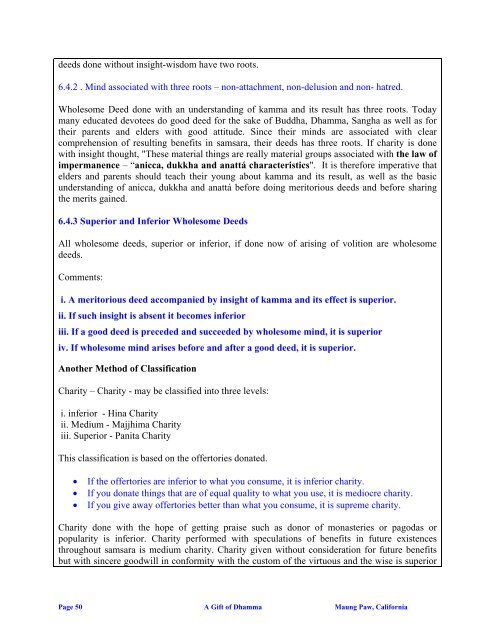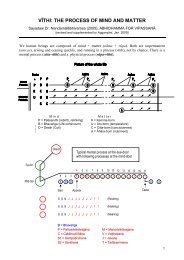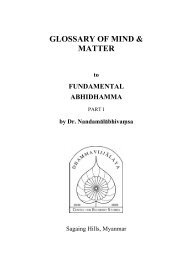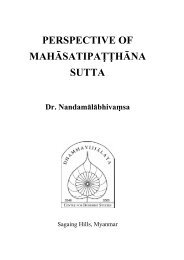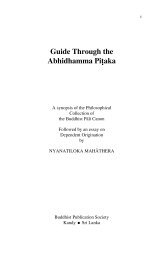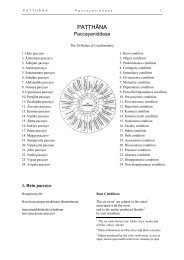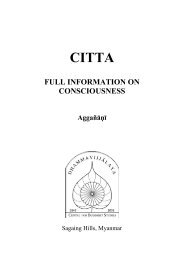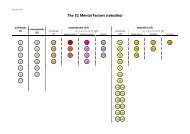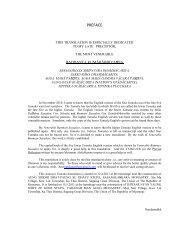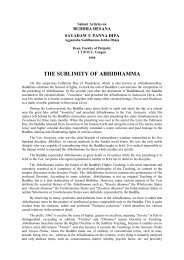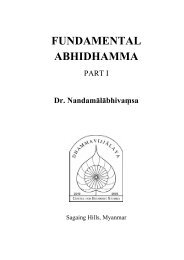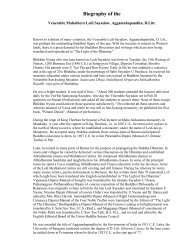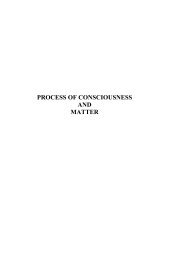ABHIDHAMMA IN DAILY LIFE - Abhidhamma.com
ABHIDHAMMA IN DAILY LIFE - Abhidhamma.com
ABHIDHAMMA IN DAILY LIFE - Abhidhamma.com
You also want an ePaper? Increase the reach of your titles
YUMPU automatically turns print PDFs into web optimized ePapers that Google loves.
deeds done without insight-wisdom have two roots.<br />
6.4.2 . Mind associated with three roots – non-attachment, non-delusion and non- hatred.<br />
Wholesome Deed done with an understanding of kamma and its result has three roots. Today<br />
many educated devotees do good deed for the sake of Buddha, Dhamma, Sangha as well as for<br />
their parents and elders with good attitude. Since their minds are associated with clear<br />
<strong>com</strong>prehension of resulting benefits in samsara, their deeds has three roots. If charity is done<br />
with insight thought, "These material things are really material groups associated with the law of<br />
impermanence – “anicca, dukkha and anattá characteristics". It is therefore imperative that<br />
elders and parents should teach their young about kamma and its result, as well as the basic<br />
understanding of anicca, dukkha and anattá before doing meritorious deeds and before sharing<br />
the merits gained.<br />
6.4.3 Superior and Inferior Wholesome Deeds<br />
All wholesome deeds, superior or inferior, if done now of arising of volition are wholesome<br />
deeds.<br />
Comments:<br />
i. A meritorious deed ac<strong>com</strong>panied by insight of kamma and its effect is superior.<br />
ii. If such insight is absent it be<strong>com</strong>es inferior<br />
iii. If a good deed is preceded and succeeded by wholesome mind, it is superior<br />
iv. If wholesome mind arises before and after a good deed, it is superior.<br />
Another Method of Classification<br />
Charity – Charity - may be classified into three levels:<br />
i. inferior - Hina Charity<br />
ii. Medium - Majjhima Charity<br />
iii. Superior - Panita Charity<br />
This classification is based on the offertories donated.<br />
• If the offertories are inferior to what you consume, it is inferior charity.<br />
• If you donate things that are of equal quality to what you use, it is mediocre charity.<br />
• If you give away offertories better than what you consume, it is supreme charity.<br />
Charity done with the hope of getting praise such as donor of monasteries or pagodas or<br />
popularity is inferior. Charity performed with speculations of benefits in future existences<br />
throughout samsara is medium charity. Charity given without consideration for future benefits<br />
but with sincere goodwill in conformity with the custom of the virtuous and the wise is superior<br />
Page 50 A Gift of Dhamma Maung Paw, California


